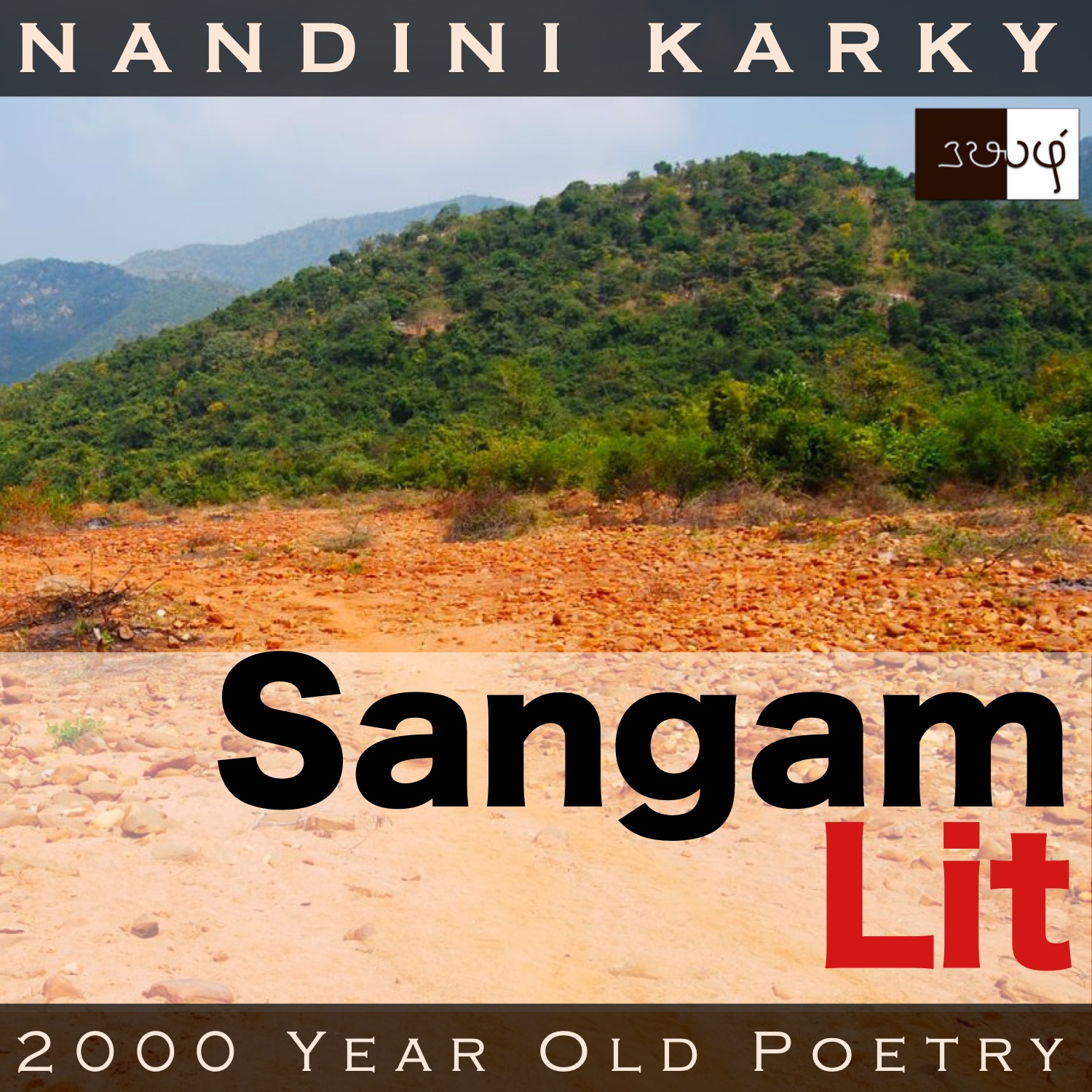Podcast: Play in new window | Download
Subscribe: Apple Podcasts | Spotify | Amazon Music | Android | iHeartRadio | TuneIn | RSS | More

In this episode, we perceive the change in circumstances in the life of a young girl, as depicted in Sangam Literary work, Kurunthogai 144, penned by Madurai Aasiriyar Kodan Kotranaar. The verse is situated in the drylands of ‘Paalai’ and speaks in the voice of the foster-mother, agonising over her daughter’s elopement.
கழிய காவி குற்றும், கடல
வெண் தலைப் புணரி ஆடியும், நன்றே
பிரிவு இல் ஆயம் உரியது ஒன்று அயர,
இவ் வழிப் படுதலும் ஒல்லாள்-அவ் வழிப்
பரல்பாற் படுப்பச் சென்றனள் மாதோ-
செல் மழை தவழும் சென்னி
விண் உயர் பிறங்கல் விலங்கு மலை நாட்டே
A verse that reflects on the paths those feet trod! When glimpsing at the opening words ‘கழிய காவி குற்றும்’, the word ‘காவி’ stood out to me for the contemporary meaning of this word denotes ‘the saffron colour’ that has become the chosen hue of Hindu religious leaders and ascetics. However, in this ancient usage, the word has nothing to do with this hue, for it’s another name for ‘blue lilies’ and the opening words mean ‘picking blue lilies growing in the backwaters’. The phrase ‘பிரிவு இல் ஆயம்’ meaning ‘inseparable friends’ conjures the image of childhood friendship and that carefree abandon that goes with that age. Turning to the words ‘பரல்பாற் படுப்பச் சென்றனள்’ meaning ‘walking on stones that ruin her feet, she left’, we are given to understand where the lady is now heading. Ending with the words ‘விலங்கு மலை நாட்டே’ meaning ‘striking mountain country’, the verse welcomes us within.
What do backwater blue-lilies and bosom buddies have to tell about the lady’s life? The context reveals that the man and lady had been leading a love relationship when the man found that the only way to protect their relationship was to elope away to his village. Acceding to his request, the lady decides to part away from her family and journeys on with him. In many other Sangam poems, we have seen how the lady is cared for by her birth mother and her foster mother, who also happens to be the mother of the lady’s confidante. The lady’s foster-mother, on hearing about her girl’s elopement says, “Plucking blue lilies from the backwaters and playing in the white-headed waves of the sea, she used to be inseparable from her playmates, indulging in games of their liking. But, unable to go on in this path, she has parted to that path filled with stones that ruin her feet, to walk towards the rain-cloud shrouded peaks of that sky-high, prominent mountain country.” With these words, the lady’s foster-mother laments about the difficulties her gentle girl would face as she elopes away with the man to a distant land.
A way of life in the past and in the present seems to be sketched here. The lady’s foster-mother starts by detailing who the lady was in the past. We find the lady visiting backwaters near her home and searching for blue lilies, spotting them and picking the same with the smile, and then, jumping into the waves of the sea and enjoying herself to the full. It would be impossible to miss the bunch of friends around, who accompany her in all these activities. Day in and day out, they would be seen together, frolicking in the simple joys of their life. This is the view of the life the lady had in the past, says the foster-mother, contrasting it with what the lady would be doing right then. She imagines her daughter’s soft feet treading on hot stones as she takes on a difficult journey for the first time in her young life. Bringing the image of rainclouds that are stopped by the peaks, the foster-mother explains that the lady walks on to that faraway mountain country.
From this description, we understand that the lady’s village was in the ‘Neythal’ region of the coast and the man’s village was in the ‘Kurinji’ region of mountains and a drylands path separates these two, at least in the imagination of the lady’s foster-mother. In that image of clouds being stopped by mountain peaks, the foster-mother weaves in a subtle metaphor for how the lady’s gentle feet would be prodded by the stones and rocks in her path. Sitting far away in their seaside village, the foster-mother feels the lady’s pain in her own feet. A question came to my mind about why the scholars over the centuries decided that these words were said by the foster-mother instead of the lady’s birth mother. The lady’s own mother could have easily said the same words but for some reason, the words here have been attributed to the foster-mother, who seems to have cared for the lady as much as the lady’s own mother. What this verse illustrates is how in the mind of parents, their children would always be that helpless, innocent things they brought into this world. Especially, when the young ones decide to fly out of their nest, this feeling becomes most pronounced and the minds of parents cling on to past visions of their children. A Sangam mother manifests this classic symptom of the empty nest syndrome!




Share your thoughts...